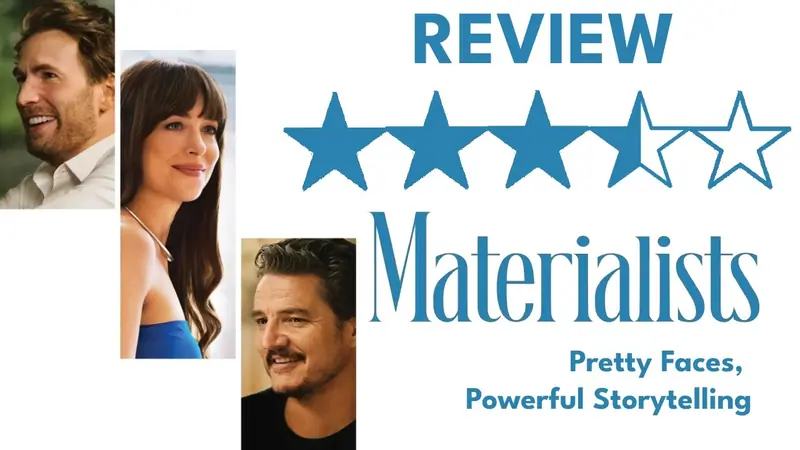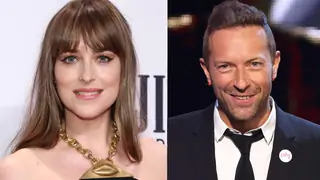'Materialists' Review: Enchanting cast meets a meaningful plot - great match & ticks all our boxes
Materialists doesn't exist to give you answers. It exists to challenge the questions we don't dare ask aloud. Celine Song gives us a rom-com that’s not afraid to get real, one that sparkles with both beauty and meaning.
Published: Friday,Jun 13, 2025 06:49 AM GMT-06:00

Materialists
Rating: ***1/2 (3.5/5) stars
Cast: Dakota Johnson, Chris Evans, and Pedro Pascal
Directed By: Celine Song
Produced By: David Hinojosa, Christine Vachon, Pamela Koffler, Celine Song
At first glance, Materialists might seem like a glossy dream, the kind of film you watch just to swoon over Pedro Pascal’s charm, Dakota Johnson’s grace, and Chris Evans’ quiet smoulder. It has the kind of cast that makes you forget the plot and lean into the pretty. But here's the surprise: it’s not just easy on the eyes. Beneath the polished surface lies a story with heart and heat, wit and weight. It dares to talk about love, money, power, and all the tiny boxes we check when we think about forever. Celine Song gives us a rom-com that’s not afraid to get real, one that sparkles with both beauty and meaning. And that’s rare.
It begins not in Manhattan but in a cave. Not with champagne flutes and silk gowns but with fur, soot, and nature around. A caveman stands before a woman, his arms full of carved spears, trophies of survival, of strength, of what he can offer. And then, gently, he picks a wildflower from the ground, twists it into a loop, and slips it onto her finger. That's when it hits you. The screen goes black. One word appears: Materialists.
It's clever. It's bold. And it sets the tone. Because this isn't just a love story, it's a story about what we bring to love. About what we offer, what we ask for, and what we believe we deserve. And from the very beginning, Celine Song tells us that love, even in its purest form, has always come with a price tag.
Love wrapped in a glossy paper

This is Celine Song's love story, but it's not the kind that floats on fairy dust or ends with swelling violins. It is sharp, observant, and self-aware. It asks not what love is. But what does love cost, and are we willing to pay?
Our protagonist, Lucy (played by Dakota Johnson in her most emotionally textured performance yet), is a professional matchmaker, a curator of modern love, armed not with roses but spreadsheets. Her world is made of lists: income brackets, college degrees, square footage, political compatibility, and jawlines. She doesn't just believe in boxes- she lives by them. And when she says she wants to marry someone rich, she says it with clarity, not shame. There's no apologizing for it. Lucy doesn't pretend. She's just honest.
Enter Harry (Pedro Pascal), a man who seems too good to be real — kind, loyal, breathtakingly wealthy, and anchored in old-school grace. He owns a $12 million apartment in Tribeca, treats service staff with dignity, and when he smiles, it feels like warmth has entered the room. Basically, a dream man. Lucy calls him a "unicorn"—because men like him don't exist. Or if they do, they usually want someone younger, someone ready to start a family.
And then there's John (Chris Evans), the ex. Not rich. Not polished. Not particularly successful. He lives in a shared flat with dirty dishes, leftover regrets, and a heart that still carries Lucy's name like a quiet prayer. He doesn't try to win her back. He just… stays.
More than a love triangle

Materialists is structured like a love triangle, but the angles are skewed. It isn't a matter of Team Harry or Team John. It's Lucy's inner geometry that matters. The film's romantic architecture isn't just about choosing a partner. It's about understanding the price tags we assign to our own worth.
What's genius about Celine Song's direction is how she writes with silence. It's there in the long glances, the half-laughed sighs, the way Lucy clutches a coffee cup just a second too long. Her characters don't just speak through dialogue; they whisper through pauses.
There's also a delicious thread of wit running through the film, not in-your-face funny, but smart and sly. When Lucy jokes that she doesn't have dowry or a cow to trade for a decent man, it's not just a laugh. It's a cultural jab pointed, precise, pulling in echoes of how marriage, globally and historically, has been less about love and more about leverage. She speaks of men's "six inches" (pause), then clarifies she's talking about height. But it lands both ways. Because even humour, here, is currency.
Performances that makes you ponder

This isn't a film that condemns materialism; it understands it. It shows why someone like Lucy, someone who grew up measuring life in risk and reward, would want guarantees.
Dakota Johnson's performance is the movie's centre of gravity. There's no manic pixie dust here, no damsel in Gucci. She plays Lucy with such internal contradiction, composed yet craving, sharp yet soft, transactional yet tender. In her hands, Lucy becomes more than a woman torn between two lovers. She becomes a question we're afraid to ask ourselves: Would I trade magic for certainty?
Pedro Pascal, in limited screen time, brings a vulnerability to Harry that stays with you. He is a man who knows he is everything someone should want, and yet he is afraid of being loved for the wrong reasons. In one scene, when Lucy tells him she doesn't deserve him, you see the flicker of heartbreak cross his face, not for her rejection but for the fear that she might be right.
But the heart of the film belongs to Chris Evans. His portrayal of John is quiet, steady, unfussy, and that's what makes it devastating. He never begs for Lucy's love. He waits, and when he speaks, it's with the weight of someone who's loved her in every version. His line -"When I look at you, I see wrinkles, grey hair, and children who look like you" could've been cheesy. But it isn't. It lands like truth.
Materialists don't exist to give you answers. It exists to challenge the questions we don't dare ask aloud. Like why financial security is taboo to desire in a partner. Or why we demonize women for wanting what men have always pursued. Or why do we think love is any less real if it's also realistic?
-
The flaws we would miss in a blink

The cinematography plays with stillness and space. Song doesn't overcrowd her frames. She lets the city breathe around her characters. The absence of a background score in several scenes lets you hear every footstep, every flick of a wine glass, and every breath caught between unsaid confessions. It's intimate. Surgical.
Still, it isn't flawless. The shift between the two halves, Harry's rich, romantic whirlwind and John's grounded, melancholic return, can feel like two separate movies stitched in the middle. Some may want more symmetry in the triangle and more scenes where the three orbits collide. But perhaps that's the point. Love isn't symmetrical. It pulls in uneven ways.

And yes, some will find Lucy frustrating. Her choices are irrational. Her logic is flawed. But here's the beautiful truth: this isn't your love story. It's hers.
Materialists doesn't exist to give you answers. It exists to challenge the questions we don't dare ask aloud. Like why financial security is taboo to desire in a partner. Or why we demonize women for wanting what men have always pursued. Or why do we think love is any less real if it's also realistic?
Final Verdict: Should You Watch It?

And maybe, in the end, what Lucy chooses is not Harry or John. Maybe it's the flower from the caveman's ring. Maybe it's the gesture, not the gift. The meaning, not the material.
Because whether it's wrapped in velvet or priced at market value, love, real love, asks not what you bring but how you hold. How you stay. How you see. And Materialists see it all.
Join Our WhatsApp Channel
Stay updated with the latest news, gossip, and hot discussions. Be a part of our WhatsApp family now!
Join NowYour reaction
 Nice
Nice Great
Great Loved
Loved LOL
LOL OMG
OMG Cry
Cry Fail
Fail













1 Comment